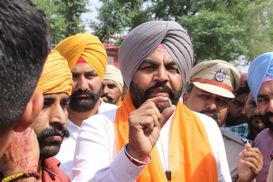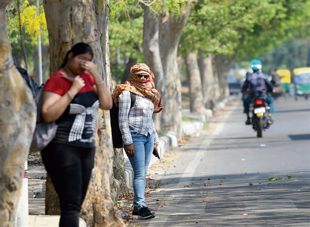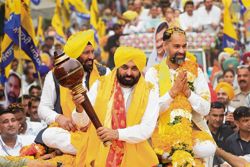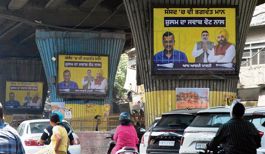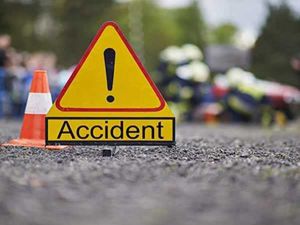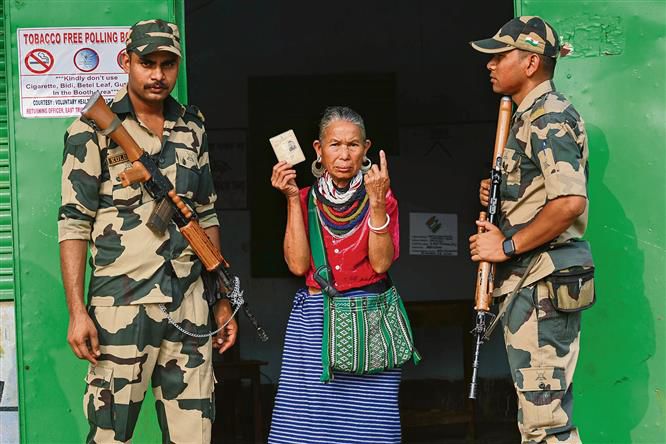
Wake-up call: What is crucial is the ability of citizens to comprehend the gradual withering away of democracy to the point where the vote is the only weapon available to them. PTI
Neera Chandhoke
Political scientist
AROUND 35 years after the fall of the Berlin Wall and the collapse of socialist societies — when Francis Fukuyama triumphantly declared that the future belonged to liberal democracy and the West proceeded to mandate global norms of democracy — we are witnessing waves of autocratisation in the Netherlands, Hungary, Italy, Burundi, Israel, Russia and India.
The V-Dem (Varieties of Democracy) Institute, based at the University of Gothenburg, Sweden, stated in its 2024 democracy report that India was one of the worst autocratisers. The country had been downgraded by V-Dem to the status of an ‘electoral autocracy’ in 2018. Democracy in the country, stated the report, has declined even further on multiple metrics. V-Dem reports categorise countries into four regime types based on their score on the liberal democratic index: liberal democracy, electoral democracy, electoral autocracy and closed autocracy. The report states that 71 per cent of the world’s population (5.7 billion people) lives in autocracies. This represents a sharp increase from 48 per cent 10 years ago. A major decline in democracy has taken place in eastern Europe and South and Central Asia. The level of liberal democracy enjoyed by the average Indian is now reportedly down to the levels of 1975, ie, the Emergency.
According to the report, a country falls into the category of liberal democracy when it institutionalises free and fair elections, ensures judicial independence, establishes robust constraints on executive overreach, rigorously safeguards civil liberties and upholds equality before the law. The government in India has occasionally used laws on sedition, defamation and counterterrorism to silence critics. A third electoral term for the BJP government “could lead to further autocratisation, given the already substantial democratic decline under Modi’s leadership and the enduring crackdown on minority rights and civil society,” the V-Dem report says.
Autocratisation is diametrically opposite to democratisation or the process of deepening democracy. It signifies that today, democracy does not die in military coups, as in Chile in 1973, or through election malpractices. Autocrats now consider sudden takeovers of power politically imprudent. The use of violence to take over the government and the consequent loss of lives provoke outbreaks of outrage and resistance, or, at the least, simmering discontent. Democracy dies when governments slowly but surely subvert institutions that realise and protect democracy to a point where only elections remain. Multi-party elections are held, but under conditions that are palpably unfair. Above all, autocratisation implies a massive concentration of power in the chief executive. Elected executives weaken checks and balances and implement measures to prevent the Opposition from challenging power.
Crucially, the substantial decline of core institutions and practices of democracy takes place under the guise of legal proprieties. The process is prolonged, measured and opaque. Contemporary autocrats have perfected the art of eroding democratic institutions while maintaining democratic façades. Piecemeal changes are cloaked in appeals to hyper-nationalism and majoritarianism and through anti-minority and anti-immigrant rhetoric.
Autocratisation is a process, not a predestined end to full-blown authoritarianism. The outcome of the process cannot be predicted. We cannot assume whether there will be a complete democratic breakdown or a return to democracy. Politics is chancy, contingent and unpredictable. Miracles can happen, perhaps. Elections, even if held under unfair conditions, can either kindle the democratic spirit, or spur the stabilisation of authoritarian regimes.
What is crucial is the ability of citizens to comprehend the gradual withering away of democracy to the point where the vote is the only weapon available to them. Nevertheless, the power of the vote gives us hope. Perhaps competition between different agendas might enable us, once again, to become what we are meant to be — Aristotle’s Zoon Politikon (political animal). Perhaps the autocrat will be deterred by the fact that the idea and ideals of democracy have become the standard for judging existing regimes. After all, after the end of the Cold War, democracy, as a global norm, has been increasingly shaping expectations.
Finally, the theory of autocratisation alerts us to the fact that political practices and policies cannot be divided into neat compartments: democracy vs authoritarianism or dictatorship or fascism. There are elements of authoritarian rule in a democratic government. And autocrats or aspiring autocrats hesitate to adopt policies that draw international condemnation or lead to an uprising within the country.
India, despite the whittling away of democratic norms and institutions, has seen at least two major social movements in recent times that have challenged political power. There were massive protests led by university students against the Citizenship Amendment Act in December 2019. In the year that followed, farmers assembled at the borders of the national capital to protest against laws that allegedly favoured the corporate sector. Today, Adivasis are opposing the transfer of their land by the government to corporates. The crucial issue of who owns land in the country is being fought in the apex court. Activists and eminent legal personalities won a court battle against electoral bonds. And thousands of Indians wrote to the Election Commission to call out the objectionable language used by the PM to describe our fellow citizens amid the Lok Sabha elections. India has been and will continue to be a home for a million mutinies. We have experienced the process of autocratisation. Whether the powers that be will or will not achieve their objective of establishing a closed autocracy depends on our vote.
Join Whatsapp Channel of The Tribune for latest updates.






















